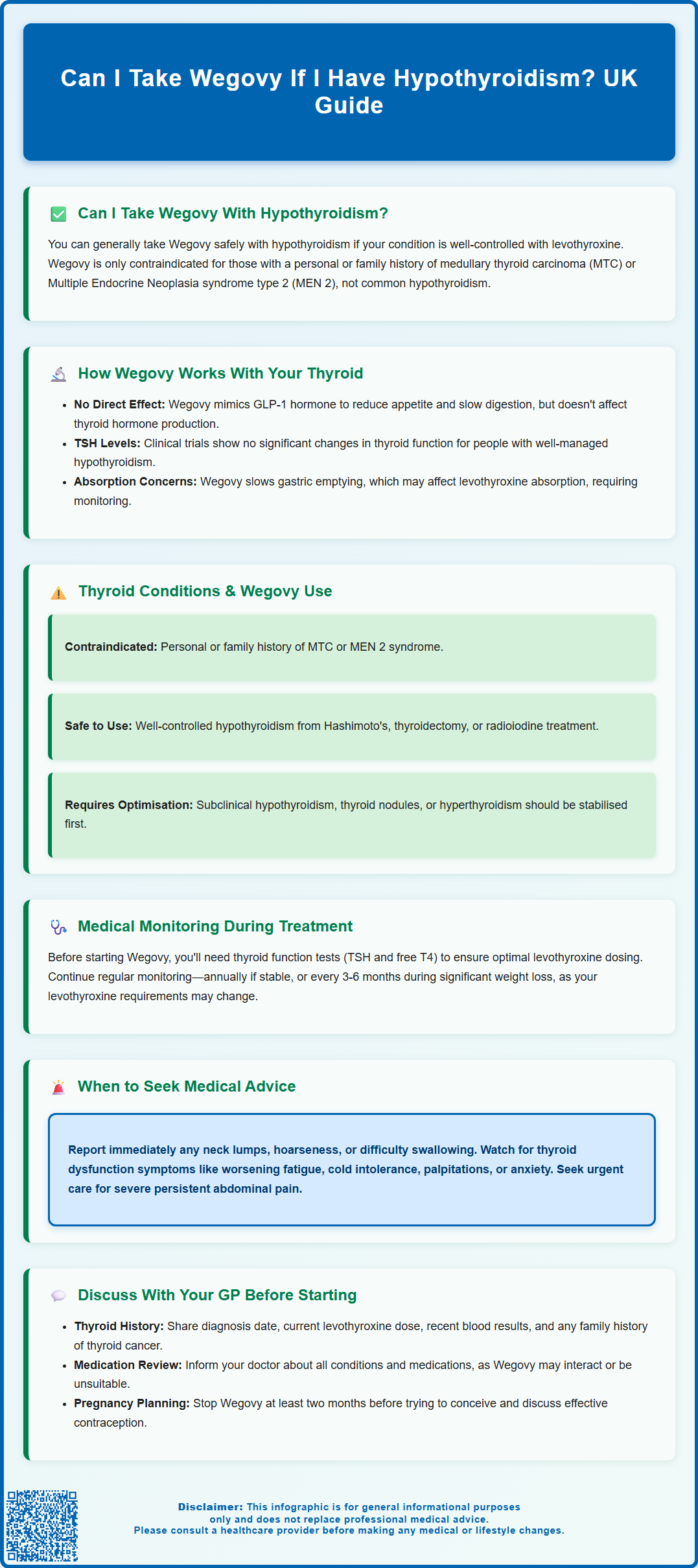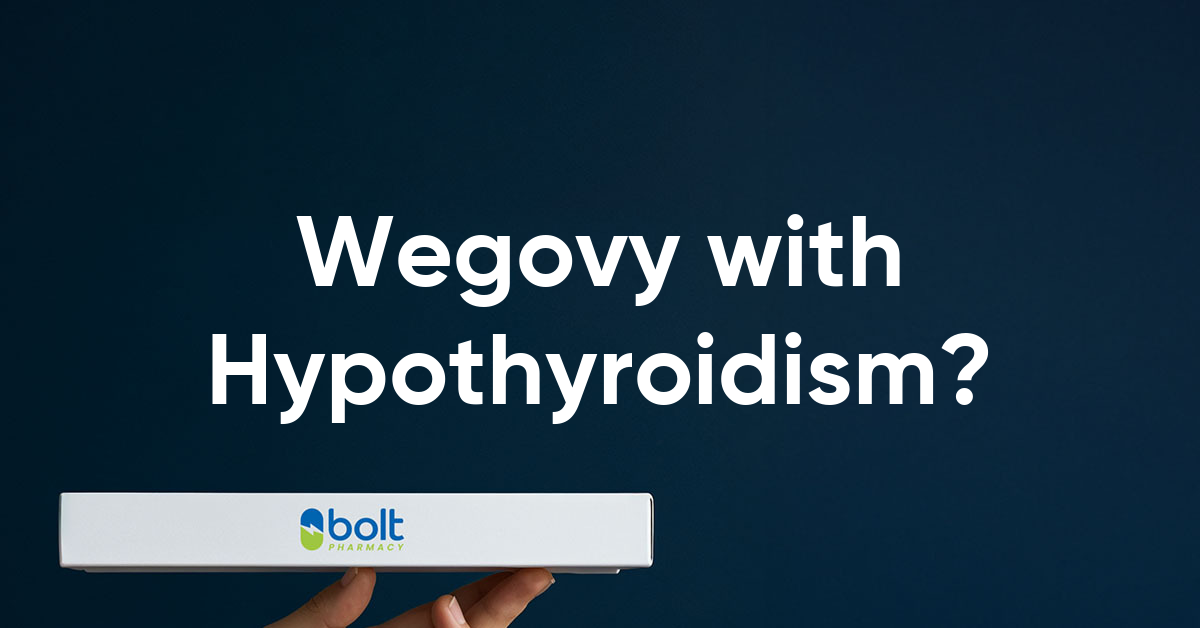If you have hypothyroidism, you may be wondering whether Wegovy (semaglutide) is safe for weight management. The good news is that well-controlled hypothyroidism is not a contraindication to Wegovy use in the UK. However, certain rare thyroid conditions—such as a personal or family history of medullary thyroid carcinoma or Multiple Endocrine Neoplasia syndrome type 2—require careful specialist assessment. For most people taking levothyroxine for an underactive thyroid, Wegovy can be prescribed safely, though thyroid function monitoring and dose adjustments may be needed during treatment. This article explains the key considerations, safety precautions, and what to discuss with your GP before starting Wegovy.
Summary: Yes, you can generally take Wegovy if you have well-controlled hypothyroidism, as it is not a contraindication in UK prescribing guidance.
- Wegovy (semaglutide) is a GLP-1 receptor agonist used for weight management in adults with obesity or overweight with comorbidities.
- Hypothyroidism itself does not prevent Wegovy use, but thyroid function should be monitored as weight loss may alter levothyroxine requirements.
- Wegovy carries precautionary warnings about thyroid C-cell tumours based on animal studies, though no causal link is established in humans.
- Patients with a personal or family history of medullary thyroid carcinoma or MEN 2 syndrome require specialist assessment before starting Wegovy.
- Regular thyroid function tests (TSH and free T4) are recommended during treatment, particularly if significant weight loss occurs.
- Report any new neck swelling, persistent hoarseness, or difficulty swallowing to your GP immediately for urgent evaluation.
Table of Contents
Can I Take Wegovy If I Have Hypothyroidism?
If you have hypothyroidism, you can generally take Wegovy (semaglutide) safely, provided your thyroid condition is well-controlled with levothyroxine or other appropriate treatment. Hypothyroidism itself is not listed as a contraindication to Wegovy use in the UK prescribing information approved by the Medicines and Healthcare products Regulatory Agency (MHRA).
However, there are important considerations. Wegovy's Summary of Product Characteristics (SmPC) contains warnings and precautions related to thyroid C-cell tumours, based on animal studies showing an increased risk of medullary thyroid carcinoma (MTC) in rodents. Whilst there is no established link between semaglutide and thyroid cancer in humans, this precautionary warning means that individuals with certain rare thyroid conditions—specifically a personal or family history of MTC or Multiple Endocrine Neoplasia syndrome type 2 (MEN 2)—should discuss these risks carefully with their specialist.
For the vast majority of people with straightforward hypothyroidism (an underactive thyroid gland, most commonly caused by autoimmune thyroiditis or Hashimoto's disease), Wegovy does not directly interfere with thyroid hormone replacement therapy. However, your levothyroxine requirements may change with significant weight loss, and semaglutide's effect on gastric emptying could potentially affect absorption of oral medications. Regular thyroid function monitoring is advisable during treatment.
It is essential to have an open conversation with your GP or endocrinologist before starting Wegovy. They will review your full medical history, current thyroid function, and any other health conditions to ensure Wegovy is appropriate and safe for you. Never start Wegovy without medical supervision, particularly if you have any thyroid-related concerns or a complex medical history.

How Wegovy Works and Its Effects on Thyroid Function
Wegovy contains semaglutide, a glucagon-like peptide-1 (GLP-1) receptor agonist. It works by mimicking the action of the naturally occurring hormone GLP-1, which is released from the gut after eating. Semaglutide enhances insulin secretion in response to elevated blood glucose, suppresses glucagon release, slows gastric emptying, and—crucially for weight management—reduces appetite by acting on centres in the brain that regulate hunger and satiety.
In terms of thyroid function, semaglutide has no established direct effect on the production or regulation of thyroid hormones such as thyroxine (T4) or triiodothyronine (T3). It does not appear to directly interfere with the hypothalamic-pituitary-thyroid axis, which controls thyroid hormone secretion. Clinical trials of semaglutide have not demonstrated consistent clinically significant changes in thyroid-stimulating hormone (TSH) levels or thyroid function tests in participants with normal thyroid function or well-managed hypothyroidism.
The primary thyroid-related concern with Wegovy stems from preclinical animal data. In rodent studies, semaglutide was associated with dose-dependent and treatment-duration-dependent increases in thyroid C-cell tumours, including medullary thyroid carcinoma. C-cells produce calcitonin, a hormone involved in calcium regulation, and are distinct from the follicular cells that produce thyroid hormones (T3 and T4). Importantly, the relevance of these findings to humans remains uncertain, as rodents are known to be particularly susceptible to GLP-1 receptor agonist-induced thyroid C-cell proliferation, and no causal relationship has been established in human clinical trials or post-marketing surveillance.
For individuals taking levothyroxine for hypothyroidism, there is no known direct interaction between semaglutide and thyroid hormone replacement. However, semaglutide delays gastric emptying, which may affect the absorption of oral medicines including levothyroxine. Both medications can be taken concurrently, but thyroid function should be monitored as clinically indicated, particularly if significant weight loss occurs.
Thyroid Conditions That May Affect Wegovy Use
While uncomplicated hypothyroidism does not preclude Wegovy use, certain rare thyroid conditions require careful consideration. According to the UK SmPC, these include:
-
Personal or family history of medullary thyroid carcinoma (MTC): MTC is a rare form of thyroid cancer arising from the parafollicular C-cells. Because of the animal data linking GLP-1 receptor agonists to C-cell tumours, patients with a personal or family history of MTC should discuss the potential risks and benefits of Wegovy with their specialist.
-
Multiple Endocrine Neoplasia syndrome type 2 (MEN 2): This is a rare inherited disorder that significantly increases the risk of MTC, phaeochromocytoma, and parathyroid tumours. Individuals with known or suspected MEN 2 should have a thorough risk assessment before considering Wegovy.
For patients with well-controlled hypothyroidism (whether due to Hashimoto's thyroiditis, post-thyroidectomy, radioiodine treatment, or other causes), Wegovy can generally be prescribed safely. Regular monitoring of thyroid function tests (TSH and free T4) should continue as per usual clinical practice, particularly if significant weight loss occurs, as this may necessitate adjustment of levothyroxine dosage.
Subclinical hypothyroidism (elevated TSH with normal free T4) is also not a contraindication, though optimisation of thyroid function before initiating weight management therapy is often advisable. Similarly, individuals with a history of thyroid nodules or goitre can use Wegovy, provided these have been appropriately investigated according to UK guidelines.
If you have hyperthyroidism (overactive thyroid) or thyrotoxicosis, this should be stabilised before considering Wegovy, as uncontrolled thyroid disease can complicate weight management and increase cardiovascular risk.
Wegovy is contraindicated during pregnancy and breastfeeding. Women of childbearing potential should use effective contraception during treatment and stop Wegovy at least two months before a planned pregnancy due to the drug's long half-life.
Safety Considerations and Medical Monitoring
Before starting Wegovy, your healthcare team will conduct a thorough medical assessment. This includes reviewing your thyroid function tests, ensuring your levothyroxine dose is optimised, and discussing any risk factors such as family history of MTC or MEN 2. A baseline measurement of thyroid-stimulating hormone (TSH) and free thyroxine (free T4) is standard practice.
Once treatment begins, routine monitoring of thyroid function should continue as clinically appropriate. For most patients with stable hypothyroidism on a consistent levothyroxine dose, annual TSH monitoring is sufficient. However, if you experience significant weight loss (which Wegovy is designed to achieve), your thyroid hormone requirements may change, and more frequent testing—perhaps at 3 to 6 months—may be warranted. Weight loss can sometimes reduce the levothyroxine dose needed, as body mass influences thyroid hormone metabolism and distribution.
Be alert to symptoms that may indicate thyroid dysfunction, such as:
-
Worsening fatigue, cold intolerance, or constipation (suggesting under-replacement)
-
Palpitations, anxiety, tremor, or heat intolerance (suggesting over-replacement)
-
A lump or swelling in the neck, hoarseness, or difficulty swallowing (which should prompt urgent evaluation according to NICE guideline NG12)
Whilst there is no evidence that Wegovy causes thyroid dysfunction in humans, you should report any new or unusual neck symptoms to your GP immediately. If you develop persistent hoarseness, dysphagia, or a palpable thyroid nodule, your doctor may arrange an ultrasound scan and, if indicated, measurement of serum calcitonin levels, though routine calcitonin monitoring is not currently recommended in the UK.
Other safety considerations include:
-
Common gastrointestinal side effects (nausea, vomiting, diarrhoea), which can affect absorption of oral medications, including levothyroxine
-
Risk of pancreatitis—seek urgent medical attention if you develop severe, persistent abdominal pain
-
Gallbladder problems, including gallstones
-
Potential worsening of diabetic retinopathy in people with type 2 diabetes
If you experience severe or persistent side effects, contact your healthcare provider, as this may necessitate temporary dose adjustment or interruption of Wegovy. You can report suspected side effects via the MHRA Yellow Card scheme at yellowcard.mhra.gov.uk or via the Yellow Card app.
What to Discuss With Your GP Before Starting Wegovy
Before starting Wegovy, it is essential to have a comprehensive discussion with your GP or prescribing clinician. Prepare to discuss the following:
-
Your thyroid diagnosis and treatment history: Explain when you were diagnosed with hypothyroidism, what caused it (if known), your current levothyroxine dose, and when your thyroid function was last checked. Bring recent blood test results if available.
-
Family history of thyroid conditions: Inform your doctor if any close relatives have had thyroid cancer, particularly medullary thyroid carcinoma, or if there is any known family history of MEN 2 syndrome.
-
Current symptoms and thyroid control: Discuss whether your hypothyroidism is well-controlled. Symptoms such as ongoing fatigue, weight gain despite treatment, or cold intolerance may indicate suboptimal thyroid hormone replacement, which should be addressed before starting weight management therapy.
-
Other medical conditions and medications: Wegovy may not be suitable if you have certain other conditions, such as severe gastrointestinal disease, a history of pancreatitis, diabetic retinopathy (if you have type 2 diabetes), or kidney impairment. Provide a complete list of all medications and supplements you take.
-
Weight loss goals and expectations: NICE guidance (TA875) supports the use of semaglutide 2.4 mg (Wegovy) for weight management in adults with at least one weight-related comorbidity and a BMI of at least 35 kg/m² (or at least 30 kg/m² for people from certain ethnic backgrounds), as part of a specialist weight management service. Treatment is typically time-limited, usually up to 2 years. Discuss realistic goals, lifestyle modifications, and the importance of dietary and physical activity support alongside medication.
-
Pregnancy planning: Wegovy is contraindicated in pregnancy and should be stopped at least two months before a planned pregnancy. If you are of childbearing potential, discuss effective contraception during treatment.
-
Monitoring plan: Clarify how often your thyroid function will be monitored during Wegovy treatment, and ensure you understand when to seek medical advice—for example, if you develop neck swelling, persistent hoarseness, or symptoms of thyroid dysfunction.
Your GP will likely refer you to a specialist weight management service for assessment and potential initiation of Wegovy, as NHS prescribing typically occurs within these services rather than in primary care. They may also refer you to an endocrinologist if your thyroid condition is complex, if there are concerns about thyroid nodules, or if you require specialist input for weight management. Open communication and shared decision-making are key to ensuring Wegovy is both safe and effective for you.
Frequently Asked Questions
Does Wegovy interfere with levothyroxine for hypothyroidism?
Wegovy does not directly interact with levothyroxine, but it may slow gastric emptying, potentially affecting absorption. Thyroid function should be monitored, and levothyroxine doses may need adjustment with significant weight loss.
What thyroid conditions prevent me from taking Wegovy?
A personal or family history of medullary thyroid carcinoma or Multiple Endocrine Neoplasia syndrome type 2 requires careful specialist assessment before Wegovy use, due to precautionary warnings from animal studies.
How often should my thyroid be monitored whilst taking Wegovy?
For stable hypothyroidism, annual TSH monitoring is usually sufficient. However, more frequent testing at 3 to 6 months may be needed if you experience significant weight loss, as this can alter thyroid hormone requirements.
The health-related content published on this site is based on credible scientific sources and is periodically reviewed to ensure accuracy and relevance. Although we aim to reflect the most current medical knowledge, the material is meant for general education and awareness only.
The information on this site is not a substitute for professional medical advice. For any health concerns, please speak with a qualified medical professional. By using this information, you acknowledge responsibility for any decisions made and understand we are not liable for any consequences that may result.
Heading 1
Heading 2
Heading 3
Heading 4
Heading 5
Heading 6
Lorem ipsum dolor sit amet, consectetur adipiscing elit, sed do eiusmod tempor incididunt ut labore et dolore magna aliqua. Ut enim ad minim veniam, quis nostrud exercitation ullamco laboris nisi ut aliquip ex ea commodo consequat. Duis aute irure dolor in reprehenderit in voluptate velit esse cillum dolore eu fugiat nulla pariatur.
Block quote
Ordered list
- Item 1
- Item 2
- Item 3
Unordered list
- Item A
- Item B
- Item C
Bold text
Emphasis
Superscript
Subscript












